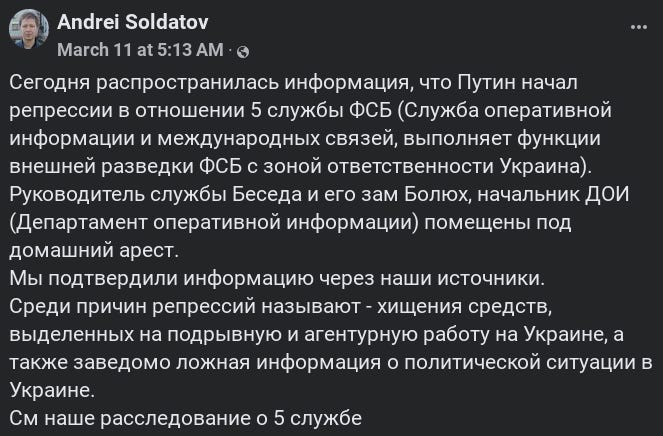Putin's intelligence problem
How the system he designed to serve him has become his undoing
"Russia's agencies bicker over blame for disastrous Ukraine invasion," a headline by the DailyMail reads. This story has been trickling through the pick-ups for over a week and looks about an inch thick from the surface—they're always bickering—but there's a deeper story here.
The primary is this March 11 Facebook post by journalist and Russian intel expert Andrei Soldatov—a confirmed, unofficial report that Putin is targeting the 5th FSB service, which does intel in Ukraine, with head Sergei Beseda and deputy Anatoly Bolyukh now under house arrest.
Soldatov says the reasons for this are embezzling funds allocated for espionage in Ukraine and deliberately feeding Putin false info about the situation there. This matters because contrary to popular misconception, Putin does not rule Russia as an autocrat even though he is one.
Instead, he has total control over the elites and essentially rules Russia through them rather than exerting direct control over the country. In other words, he's a dictator by influence rather than by diktat. This is far less efficient, so then why does he do it?
Consider 2008, when he stepped down and named Dmitry Medvedev as president, as Moscow-based political analyst Masha Lipman notes, "to maintain the appearance of ... a procedural democracy."
Putin actually cares about seeming democratic despite being nothing of the kind, and therefore rules through a system of suggestions rather than direct command in order to maintain the illusion. Problem is, this lack of clear diktat can cause misinterpretation of his objectives.
At every level of the system, people are trying to infer what their superiors want done and mistakes get made, but that's the price Putin is apparently willing to pay to keep the crime scene free of his fingerprints.
But inefficiencies that result from people with room temperature IQs trying to read his mind are not the only problem. Russia is profoundly corrupt, largely by design, so people lie to please their bosses while simultaneously stealing from them.
And apparently some of those people may include Beseda and Bolyukh. Maybe Putin is just lashing out at his Ukraine intel team because the war is going so badly. But maybe these guys are actually guilty. Maybe they fed Putin bad intel on Ukraine, talking up what a good job they'd done on planting the seeds of dissent, talking up the might of the Russian military, all while draining coffers dedicated to Ukraine espionage—so Putin goes in thinking he's got a weak and mostly compliant Ukraine in front of him as well as a full-fanged, battle-ready army behind him, only to discover to his dismay that his own intelligence officers have been lying and stealing and in fact neither of those two things are true and now he's stretched across the second-largest and one of the most militarized nations in Europe.
In a nutshell, that's why the story of Russian intel bickering is not just a typical story of finger-pointing amid failure but one about the inherent flaws in corrupt rule that have not only facilitated Putin's rise but now also left his belly exposed as Ukrainian sharks circle.


